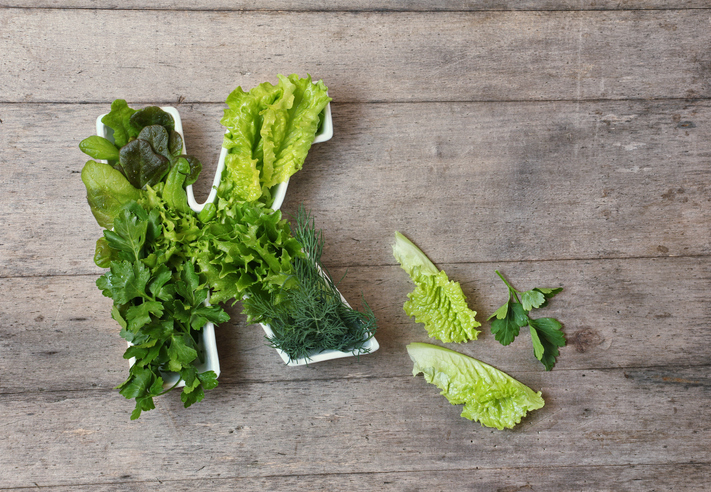
Want To Live Longer? Make Sure You Are Getting Enough Vitamin K
By Joy Stephenson-Laws, J.D., Founder
Actress Jennifer Aniston is one of those celebrities who seems to just get better with age. Apparently, the 51-year-old’s morning routine involves having some celery juice.
According to one report, she "also tries to opt for green celery juice in the mornings rather than her coffee. This is because celery is packed with vitamin K which is good for circulation and reducing stress levels.”
Vitamin K is present in celery, however, you will find higher amounts of this nutrient in other plant foods such as kale, collard greens, broccoli and asparagus.
But in order to really understand this nutrient and where you can find it, you have to remember the following:
According to the National Institutes of Health’s Office of Dietary Supplements, vitamin K is a generic name for a family of compounds.
“These compounds include phylloquinone (vitamin K1) and a series of menaquinones (vitamin K2).”

So basically, phylloquinone (vitamin K1), which is mainly found in green leafy vegetables, is the main dietary form of vitamin K. There is a reason why you were likely told as a child to eat your greens and now as an adult are probably encouraged by your doctor to do the same.
Vitamin K serves a number of important functions in the body. It is critical for:
- Blood clotting and healing wounds. It is actually known as “the blood-clotting vitamin.”
- Blood vessel health (helps calcium from building up in the artery walls).
- Bone health (may even help reduce fracture risk).
This vitamin is so important to our health that it is recommended that newborn babies receive vitamin K injections in order to help prevent vitamin K deficiency bleeding (VKDB).Some reports are even saying that people who have died of COVID-19 or have had to be hospitalized as a result of contracting coronavirus were also found to be deficient in vitamin K, suggesting that a deficiency in this vitamin may be key in overcoming the virus.
“More specifically, the vitamin’s ability to regulate clotting is what the researchers hope could help protect against severe COVID-19 outcomes, as the novel disease has been known to cause dangerous and potentially deadly blood clots in some patients,” according to one news report.
Now, menaquinones (vitamin K2) are mostly found in animal foods and fermented foods such as butter, whole milk (from grass-fed cows), egg yolks, liver and mature cheeses and curd. So if you are vegan or vegetarian, you may want to be especially aware of the possibility of vitamin K2 deficiency, but when most people are talking about vitamin K, they are referring to vitamin K1 and the importance of getting it from plant-based foods.
Vitamin K may help you live longer.I don’t know about vitamin K’s ability to reduce stress levels (as mentioned in the article about Jennifer Aniston), however, a recent study found evidence which suggested that older adults with lower vitamin K levels were more likely to die within 13 years compared to older adults who had adequate vitamin K levels, according to one report discussing the study.
This was evident in a sample of nearly 4,000 American adults (ages 54 to 76) of multiple different ethnic backgrounds (one-third of the people consisting of the sample were non-white). All participants were free of heart disease at baseline.
“The results showed no significant associations between vitamin K levels and heart disease. However, the people with the lowest vitamin K levels had a 19 percent higher risk of death, compared to those with vitamin K levels that reflected adequate vitamin K intake,” according to the study report.
However, there still may be a connection to heart disease.
"The possibility that vitamin K is linked to heart disease and mortality is based on our knowledge about proteins in vascular tissue that require vitamin K to function. These proteins help prevent calcium from building up in artery walls, and without enough vitamin K, they are less functional,” said one of the authors of the study.
In addition to this, an older but still fairly recent study found evidence which showed that low vitamin K levels increase the risk of mobility limitations and disability in older adults. This makes sense when you think of vitamin K’s important role not only in blood vessel health but also bone health.
“Vitamin K deficiency in adults is rare, but may occur in people taking medications that block vitamin K metabolism such as antibiotics, or in those with conditions that cause malabsorption of food and nutrients,” reports Harvard T.H. Chan School of Public Health.
Although this deficiency may be rare, it is important to acknowledge that older adults may be especially at risk for it. As we age, the possibility that we take medications increases and our bodies tend to have more issues efficiently absorbing nutrients from the foods we eat.
Furthermore, “[p]oor appetite is a common problem in older people living at home and in care homes, as well as hospital inpatients. It can contribute to weight loss and nutritional deficiencies, and associated poor healthcare outcomes, including increased mortality,” (National Institutes of Health (NIH)).
So as a Boomer or older adult, you especially want to be mindful of vitamin K deficiency or any nutrient deficiency for that matter. And you can be proactive by undergoing routine nutrient tests. If the tests reveals, you are deficient in vitamin K or any other essential nutrient, a competent healthcare professional can work with you on making the necessary dietary changes and recommend quality supplements if necessary. The test will also show if you have too much of a certain nutrient, however, this is usually pretty rare unless you are taking supplements without any guidance.
Also keep in mind that if you are taking blood thinners, this can interact with vitamin K in a way that can be threatening to your health. So, again, speak with a competent healthcare professional about diet and supplementation if you are taking blood thinners.
And as always, eat your greens!
Enjoy your healthy life!
The pH professional health care team includes recognized experts from a variety of health care and related disciplines, including physicians, attorneys, nutritionists, nurses and certified fitness instructors. This team also includes the members of the pH Medical Advisory Board, which constantly monitors all pH programs, products and services. To learn more about the pH Medical Advisory Board, click here.



